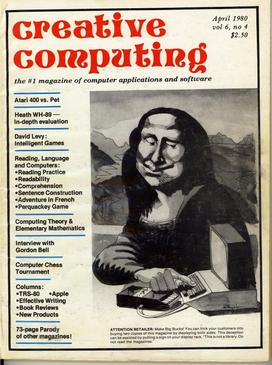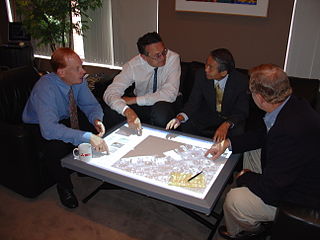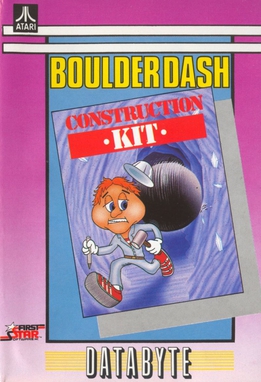External links
| Kits |
|
|---|---|
| Software | |
| Companies | |
| |
| Main articles | ||
|---|---|---|
| Types | ||
| Classifications | ||
| Locomotion | ||
| Navigation and mapping | ||
| Research | ||
| Companies | ||
| Related | ||
| | This computing article is a stub. You can help Wikipedia by expanding it. |
The Robotic Workshop was a toy kit, much like Lego Mindstorms, that allowed users to build and program robots using a home computer.
Access Software announced The Robotic Workshop in the January 1987 issue of Ahoy! magazine. A review later appeared in the May 1988 issue of Compute! magazine. The kit included over 50 Capsela parts, including two motors, gears, wheels, and sensors. It also included an electronic control unit that plugged into the user port of a Commodore 64 , an instruction manual with 50 tutorial projects, and special programming software on a floppy disk. It was later released for Apple II, Atari 8-bit computers, and IBM PC.

Lego Mindstorms is a discontinued line of educational kits for building programmable robots based on Lego bricks.

A type-in program or type-in listing was computer source code printed in a home computer magazine or book. It was meant to be entered via the keyboard by the reader and then saved to cassette tape or floppy disk. The result was a usable game, utility, or application program.

Compute!, often stylized as COMPUTE!, was an American home computer magazine that was published from 1979 to 1994. Its origins can be traced to 1978 in Len Lindsay's PET Gazette, one of the first magazines for the Commodore PET computer. In its 1980s heyday, Compute! Covered all major platforms, and several single-platform spinoffs of the magazine were launched. The most successful of these was Compute!'s Gazette, which catered to VIC-20 and Commodore 64 computer users.

PC Magazine is an American computer magazine published by Ziff Davis. A print edition was published from 1982 to January 2009. Publication of online editions started in late 1994 and continues as of 2024.

Creative Computing was one of the earliest magazines covering the microcomputer revolution. Published from October 1974 until December 1985, the magazine covered the spectrum of hobbyist/home/personal computing in a more accessible format than the rather technically oriented Byte.

Antic was a print magazine devoted to Atari 8-bit computers and later the Atari ST. It was named after the ANTIC chip in the 8-bit line which, in concert with CTIA or GTIA, generates the display. The magazine was published by Antic Publishing from April 1982 until June/July 1990.Antic printed type-in programs, reviews, and tutorials, among other articles. Each issue contained one type-in game as "Game of the Month." In 1986, STart magazine was spun off to exclusively cover the Atari ST line.

ANALOG Computing was an American computer magazine devoted to Atari 8-bit computers. It was published from 1981 until 1989. In addition to reviews and tutorials, ANALOG printed multiple programs in each issue for users to type in. Almost every issue included a machine language video game—as opposed to Atari BASIC—which were uncommon in competing magazines. Such games were accompanied by the assembly language source code. ANALOG also sold commercial games, two books of type-in software, and access to a custom bulletin-board system. After the Atari ST was released, coverage of the new systems moved to an ST-Log section of the magazine before spinning off into a separate publication under the ST-Log name.

APC is a computer magazine in Australia. It is published monthly and comes with a cover-mounted DVD of software. It is published by Future Australia.

RoboSport is a 1991 turn-based tactics computer game. It was created by Edward Kilham and developed and published by Maxis.

3D Construction Kit, also known as 3D Virtual Studio, is a utility for creating 3D worlds in Freescape. Developed by Incentive Software and published by Domark, it was released in 1991 on multiple platforms. The game originally retailed for £24.99 for the 8-bit version, and £49.99 for 16-bit version and the 32-bit Acorn Archimedes version, in the United Kingdom. A sequel, 3D Construction Kit II, was released in 1992, but only available on Amiga, Atari ST and MS-DOS.

Web User, branded as WebUser, was a fortnightly magazine published in the United Kingdom from 2001 until 2020. It covered topics relating to computing. Its sister magazine was ComputerActive.
Magnesium Media is a computer magazine company based in Stockport, Greater Manchester, in the United Kingdom. Most of its published titles are now discontinued

The Micro User was a British specialist magazine catering to users of the BBC Microcomputer series, Acorn Electron, Acorn Archimedes and, to a limited extent, the Cambridge Z88. It had a comprehensive mix of reviews of games, application software, and the latest Acorn computers; type-in programs, a correspondence page offering help with computer problems, and approachable technical articles on programming and the BBC Micro's internals.

Dream Zone is an adventure game developed by JAM Software and published by Baudville. It was released in 1988 for the Apple II and Apple IIGS, followed by versions for MS-DOS, the Amiga, and the Atari ST.

The DiamondTouch table is a multi-touch, interactive PC interface product from Circle Twelve Inc. It is a human interface device that has the capability of allowing multiple people to interact simultaneously while identifying which person is touching where. The technology was originally developed at Mitsubishi Electric Research Laboratories (MERL) in 2001 and later licensed to Circle Twelve Inc in 2008. The DiamondTouch table is used to facilitate face-to-face collaboration, brainstorming, and decision-making, and users include construction management company Parsons Brinckerhoff, the Methodist Hospital, and the US National Geospatial-Intelligence Agency (NGA).

Home computers were a class of microcomputers that entered the market in 1977 and became common during the 1980s. They were marketed to consumers as affordable and accessible computers that, for the first time, were intended for the use of a single, non-technical user. These computers were a distinct market segment that typically cost much less than business, scientific, or engineering-oriented computers of the time, such as those running CP/M or the IBM PC, and were generally less powerful in terms of memory and expandability. However, a home computer often had better graphics and sound than contemporary business computers. Their most common uses were word processing, playing video games, and programming.

Boulder Dash Construction Kit is the fourth game in the Boulder Dash series. It was published for the Commodore 64 and Atari 8-bit computers in 1986 by Epyx. Ports were released for the Apple II, Atari ST, Amiga, Amstrad CPC, ZX Spectrum, and MS-DOS. The Spectrum version was rereleased as Boulder Dash IV: The Game. Boulder Dash Construction Kit includes new levels and a level editor.

BEEBUG was a magazine published for users of the BBC Micro between 1982 and 1994. It was the first subscription magazine for computers made by Acorn Computers.
Scetlander was a software publisher which released titles for various 8- and 16-bit home computer systems in the 1980s and 1990s.
Kano Computing was a global computer hardware and software start-up based in London. The company went into administration in 2023 and the business assets were sold to Alex Klein.